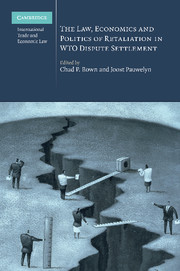Book contents
- Frontmatter
- Contents
- List of tables and figures
- Contributors
- Introduction: trade retaliation in WTO dispute settlement: a multi-disciplinary analysis
- PART I Background and goal(s) of WTO retaliation
- PART II A legal assessment after ten arbitration disputes
- PART III An economic assessment after ten arbitration disputes
- PART IV The domestic politics and procedures for implementing trade retaliation
- PART V Problems and options for reform
- PART VI New frontiers and lessons from other fields
- 21 Cross-retaliation and suspension under the GATS and TRIPS agreements
- 22 Cross-retaliation in TRIPS: issues of law and practice
- 23 Preliminary thoughts on WTO retaliation in the services sector
- 24 Compensation assessments: perspectives from investment arbitration
- 25 Reforming WTO retaliation: any lessons from competition law?
- Index
23 - Preliminary thoughts on WTO retaliation in the services sector
Published online by Cambridge University Press: 26 February 2010
- Frontmatter
- Contents
- List of tables and figures
- Contributors
- Introduction: trade retaliation in WTO dispute settlement: a multi-disciplinary analysis
- PART I Background and goal(s) of WTO retaliation
- PART II A legal assessment after ten arbitration disputes
- PART III An economic assessment after ten arbitration disputes
- PART IV The domestic politics and procedures for implementing trade retaliation
- PART V Problems and options for reform
- PART VI New frontiers and lessons from other fields
- 21 Cross-retaliation and suspension under the GATS and TRIPS agreements
- 22 Cross-retaliation in TRIPS: issues of law and practice
- 23 Preliminary thoughts on WTO retaliation in the services sector
- 24 Compensation assessments: perspectives from investment arbitration
- 25 Reforming WTO retaliation: any lessons from competition law?
- Index
Summary
Introduction
As of November 2008 there have been seventeen Article 22.6 arbitrations involving ten distinct WTO disputes. The great majority of these arbitrations were in the goods sector. The Dispute Settlement Body (DSB) has authorised suspension of concessions related to services in one case and intellectual property rights in two cases. EC–Bananas III (Ecuador) involved trade in both goods and services, and the complaining party won the right to suspend GATT, GATS and TRIPs commitments. US–Gambling dealt also with trade in services, and the complaining party won the right to suspend TRIPs commitments. At the time of writing (end of 2008) Brazil is again threatening cross-retaliation in US–Cotton under the GATS and TRIPs agreements.
There is little experience with GATS retaliation and cross-retaliation and few articles have discussed this subject. This explains the cautious title of this chapter. Why have there not been more Article 22.6 arbitrations involving suspension of GATS concessions and other obligations? In part, this reflects the small number of GATS disputes, and in part this is because many developing countries made few commitments in the services sector. There may also be other reasons why there have not been more disputes involving GATS suspensions. This chapter examines the viability of retaliation and cross-retaliation in the services sector, and the extent to which they might provide a means to induce compliance with DSB decisions.
Summary of the legal framework
Article 22.3 of the DSU sets forth the general rules applicable to suspension of concessions, including the rules applicable to suspension of concessions in the services sector.
- Type
- Chapter
- Information
- Publisher: Cambridge University PressPrint publication year: 2010

